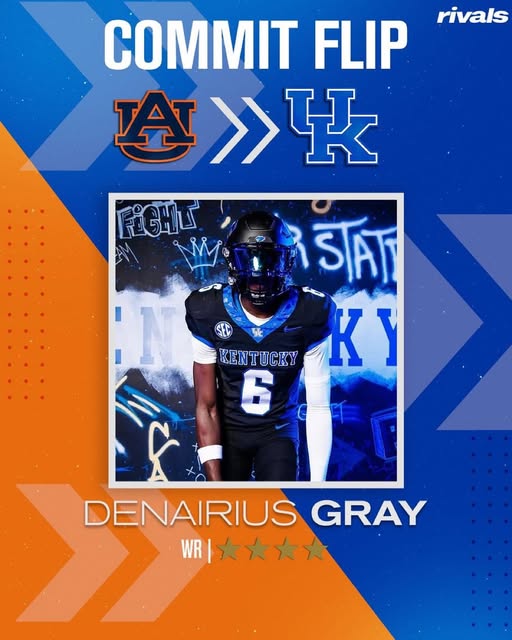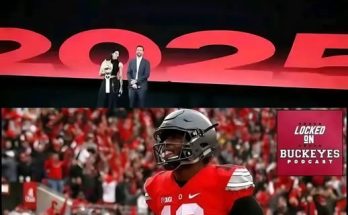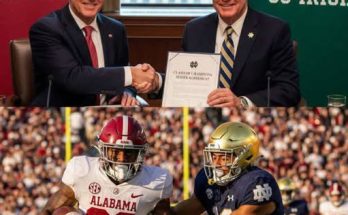The Auburn Tigers have suffered a significant blow to their 2025 recruiting class as four-star wide receiver Denairius Gray has flipped his commitment to the Kentucky Wildcats. The news comes as a major disappointment for Auburn fans who had high hopes for Gray’s potential impact on the Tigers’ offense. Gray, a dynamic playmaker out of Florida, had been a key piece of Auburn’s recruiting efforts, and his decision to switch allegiances underscores the intense competition in the SEC for elite talent.
Gray’s recruitment has been closely followed by analysts and fans alike, with many considering him one of the top receivers in the 2025 cycle. His combination of speed, route-running ability, and strong hands made him a coveted prospect for multiple programs. Auburn initially secured his commitment earlier this year, but Kentucky’s relentless pursuit, coupled with a strong pitch from head coach Mark Stoops and his staff, ultimately swayed Gray’s decision. The Wildcats have been building momentum on the recruiting trail, and landing a player of Gray’s caliber is a testament to their growing appeal in the SEC.
For Auburn, losing Gray is a setback, particularly as the Tigers look to bolster their receiving corps. Hugh Freeze and his staff have been working diligently to upgrade the talent on offense, and Gray was expected to be a cornerstone of that effort. His departure leaves a void in Auburn’s recruiting class, and the coaching staff will now need to regroup and identify other targets to fill the gap. The Tigers have other talented receivers on their board, but Gray’s elite skill set made him a priority, and replacing him won’t be easy.
The reasons behind Gray’s flip are still emerging, but several factors likely played a role. Kentucky has been making strides in recruiting under Stoops, particularly in developing players for the NFL. The Wildcats have produced several standout receivers in recent years, and Gray may see Lexington as a better path to achieving his professional aspirations. Additionally, Kentucky’s offensive scheme under coordinator Liam Coen has been attractive to skill-position players, emphasizing a pro-style passing attack that showcases receivers in versatile roles.
Another potential factor is Auburn’s recent offensive struggles. While Freeze is known for his high-powered offenses, the Tigers have yet to fully establish an identity on that side of the ball. Quarterback play has been inconsistent, and the receiving corps has lacked a true go-to playmaker. Gray may have had concerns about how he would fit into Auburn’s system or whether the Tigers could provide the offensive stability needed to maximize his potential. In contrast, Kentucky has shown steady improvement in developing offensive talent, which may have given Gray more confidence in their ability to prepare him for the next level.
The loss of Gray also raises questions about Auburn’s recruiting strategy moving forward. The Tigers have been aggressive in pursuing top-tier talent, but retaining commitments has been a challenge. In the modern era of college football, where decommitments and flips are increasingly common, coaching staffs must not only secure pledges but also maintain relationships to keep recruits locked in until signing day. Auburn will need to evaluate whether there were any missteps in Gray’s recruitment and how they can prevent similar situations in the future.
On the flip side, Kentucky’s ability to land Gray is a significant win for their program. The Wildcats have traditionally been seen as a football program that thrives on development rather than blue-chip recruiting, but pulling a player of Gray’s caliber away from an SEC rival signals a shift in perception. Kentucky’s recent success, including multiple bowl victories and competitive performances against top-tier SEC teams, has elevated their standing in the eyes of recruits. Gray’s commitment could also have a ripple effect, encouraging other high-profile prospects to consider Lexington as a viable destination.
For Auburn, the focus now shifts to damage control. The Tigers still have a solid recruiting class, but losing a player of Gray’s stature is never ideal. Freeze and his staff will need to reassure other commits while ramping up efforts to identify and pursue alternative options at receiver. The transfer portal could also become a factor, as Auburn may look to add an experienced pass-catcher to offset the loss.
Beyond the immediate recruiting implications, Gray’s decision highlights the fierce competition within the SEC. The conference is stacked with programs that can pitch playing time, development, and exposure at the highest level. Recruiting battles are won and lost over the smallest details—relationships, playing style, academic support, and even NIL opportunities. Kentucky’s success in flipping Gray suggests that the Wildcats are becoming a more formidable player in these battles, which could reshape the recruiting landscape in the SEC East.
For Auburn fans, the sting of losing Gray will linger, but there is still plenty of time before signing day to recover. Recruiting is a fluid process, and the Tigers have shown the ability to close strong under Freeze. However, this situation serves as a reminder that no commitment is set in stone until the ink is dry. The coaching staff will need to double down on their efforts to ensure that other top targets remain solid in their pledges while continuing to sell the vision for Auburn’s future.
As for Gray, his decision to join Kentucky puts him in a position to be a focal point of their offense. The Wildcats have been searching for a true No. 1 receiver, and Gray has the talent to fill that role immediately. His arrival could elevate Kentucky’s passing game, providing quarterback Beau Allen—or whoever is under center—with a reliable weapon on the outside. If Gray lives up to his potential, he could follow in the footsteps of recent Kentucky standouts like Wan’Dale Robinson and Lynn Bowden Jr., who thrived in Coen’s system before moving on to the NFL.
In the grand scheme of things, one recruit flipping commitments isn’t a program-defining moment, but it does underscore the challenges of recruiting in the SEC. Auburn will need to bounce back quickly, using this as motivation to secure other elite talents. Meanwhile, Kentucky’s ability to pull off this coup is a sign of their rising stock in college football. The Wildcats are no longer just a developmental program—they’re a legitimate threat on the recruiting trail.
The 2025 recruiting cycle is far from over, and Auburn still has time to make up ground. But losing Denairius Gray to Kentucky is a reminder of how unpredictable and competitive recruiting can be. For the Tigers, the response to this setback will be crucial in shaping the future of the program under Hugh Freeze. For the Wildcats, it’s another step forward in their quest to establish themselves as a consistent contender in the SEC. And for Gray, the next chapter of his football journey begins in Lexington, where he’ll look to prove that his decision was the right one.



